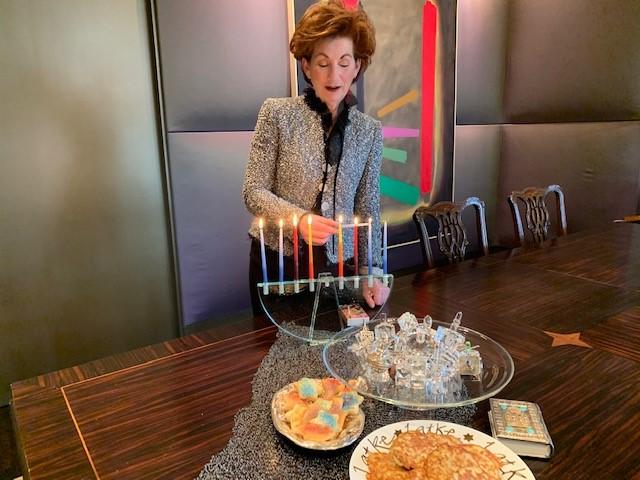Dec. 10, 2020
A symbol for freedom of religion, Chanukah begins at sundown this evening

The Jewish holiday of Chanukah, as we celebrate it today, is a joyous festival of lights that takes place over a period of eight days.
Chanukah commemorates the heroic struggle of the Jews during a time of religious persecution by the Greco-Syrians, led by King Antiochus. During this period, between 168-165 BCE, Jews were prohibited from carrying out their religious practices and forced to worship Hellenic gods.
- Pictured above: UCalgary chancellor Deborah Yedlin
Over three years, a small number of Jews, including the Maccabee family, fought back against the Greco-Syrians, finally emerging triumphant and reclaiming their temple of worship. This victory marked the spiritual revival of Judaism and the triumph of monotheism over pagan rituals.
When the Maccabees entered the temple, they found it had been desecrated. Their first task was to rededicate the temple to allow Jewish worship to take place. This ritual included the lighting of a menorah to signify God’s presence, but the Maccabees found only enough oil in the temple to keep the menorah lit for one day. Miraculously, it burned for eight days, hence the lighting of candles accompanied by prayers and blessings through the eight days of Chanukah.
You could say Chanukah symbolizes an important value enshrined in Section 2 of our Constitution: the freedom of religion. It's a triumph against the denial of the freedom of worship and democracy over dictatorship and remains relevant in values and principles to this day.
As all Jewish holidays begin the night before, at sundown, the first candle this year is being lit on Dec. 10, with one more candle lit in the following nights until the menorah is ablaze on the final night. It's customary to leave the menorah in the window, to celebrate the holiday and cast light into the darkness.
Chanukah, however, is a lesser holiday within the Jewish tradition. Its relative prominence lies in the fact that it often falls close to Christmas. Were it to take place during any other time in the calendar, it’s likely no one outside the Jewish faith would pay attention.
Like many holidays, the festival of Chanukah involves traditional celebrations and rituals that bring together families and communities. This year, for the first time since it began 32 years ago, the community of lighting of the menorah will take place virtually — on Dec. 10 — rather than at City Hall.
In addition to the lighting of the holiday candles, there is plenty of singing, games — the most iconic being the spinning of a dreidel — and modest gifts intended for children. The traditional foods eaten throughout the holiday include potato pancakes (known as latkes) and jam-filled donuts (sufganiyot) — all fried in oil, as a nod to the miracle of the menorah in the temple. For eight nights, family and friends gather to kindle the lights of the menorah, which has become an eternal symbol of the triumph of light over darkness and evil, and to share the stories of the triumph of the Maccabees over the Greco-Syrians.

UCalgary senator Lauren Bell


